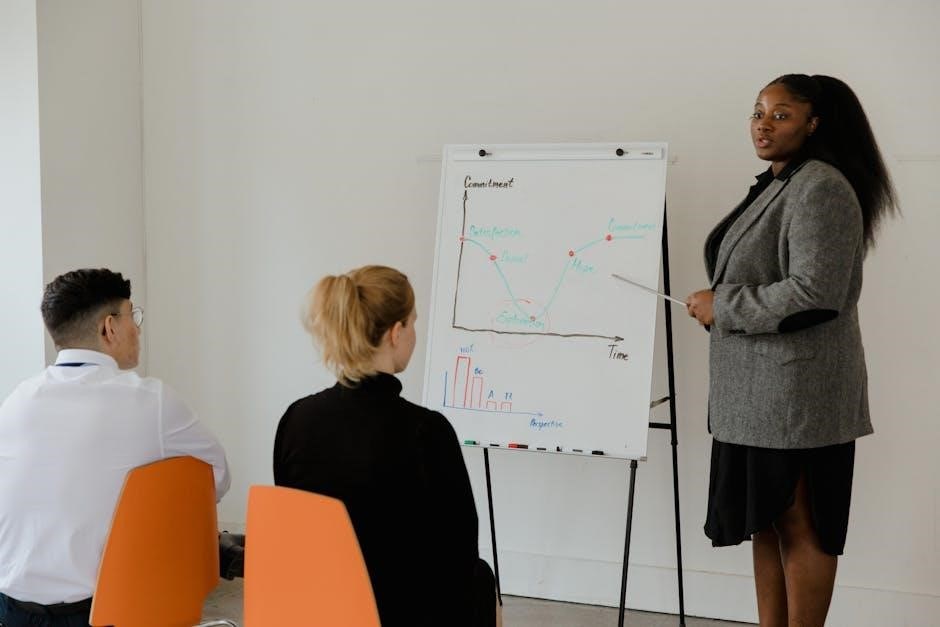Leadership workshop activities are designed to foster personal and professional growth through interactive exercises, group collaboration, and experiential learning. These workshops focus on developing key skills like communication, decision-making, and emotional intelligence.
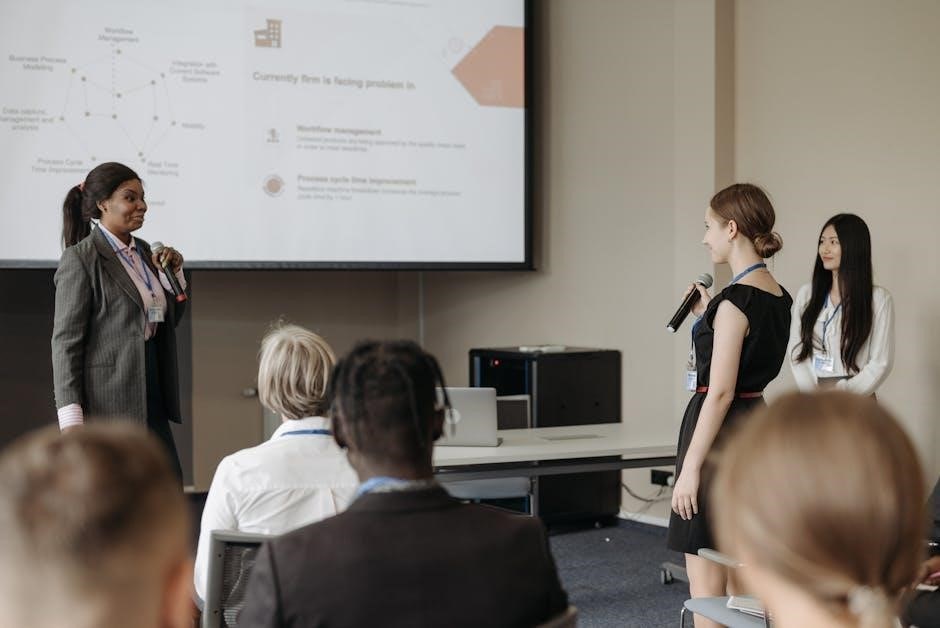
Understanding Leadership
Leadership is the process of guiding and influencing individuals or teams to achieve common goals. It involves decision-making, communication, and emotional intelligence to inspire and motivate others effectively in real-world applications.
2.1 Definition and Importance
Leadership is the process of guiding and influencing individuals or teams to achieve shared objectives. It empowers individuals to inspire, motivate, and direct others toward common goals. Effective leadership fosters collaboration, innovation, and accountability, ensuring organizations thrive in dynamic environments. Leadership is not merely about authority but about vision, communication, and emotional intelligence. It plays a critical role in shaping culture, driving change, and overcoming challenges. Strong leaders create environments where individuals grow, both personally and professionally. In the context of workshops, leadership development focuses on enhancing these skills through practical exercises and real-world applications. By cultivating leadership, organizations build resilience, improve decision-making, and foster a culture of continuous improvement. Leadership is essential for driving success, whether in business, education, or community settings. Its importance lies in its ability to transform individuals and teams, ensuring they align with shared values and goals. Leadership is the cornerstone of progress and innovation in any field.
2.2 Leadership vs. Management
Leadership and management are often confused but serve distinct purposes. Leadership focuses on inspiring, motivating, and guiding individuals to achieve a shared vision. It emphasizes empowerment, innovation, and fostering a sense of purpose. In contrast, management centers on planning, organizing, and controlling resources to meet specific goals. It prioritizes efficiency, accountability, and adherence to processes. While leaders set the direction and inspire change, managers ensure tasks are completed effectively. Both roles are essential but require different skill sets. Leadership is about influencing people, while management is about coordinating systems. Effective leaders often possess strong emotional intelligence and vision, whereas managers excel at problem-solving and operational execution. Understanding this distinction helps individuals develop the right mindset for their roles. Workshops often highlight these differences through activities like brainstorming stereotypes or small group discussions, enabling participants to recognize their strengths and areas for growth. This clarity enhances both personal and organizational performance.
2.3 Principle-Centered Leadership

Principle-centered leadership emphasizes guiding others based on timeless values and ethical foundations. It focuses on aligning actions with core principles such as integrity, empathy, and responsibility. This approach prioritizes long-term success over short-term gains, fostering trust and credibility. Leaders who adopt this style empower their teams by creating an environment of mutual respect and shared purpose. Workshops often include exercises like identifying personal values, brainstorming stereotypes, and reflective discussions to help participants internalize these principles. Activities such as small group brainstorming or writing leadership traits on sticky notes encourage deeper understanding. Principle-centered leadership also encourages leaders to serve others, promoting a culture of collaboration and accountability. By grounding decisions in ethical principles, leaders build sustainable and positive impacts. This approach is highlighted in resources like “The Leadership Challenge” and is often taught through experiential learning. It remains a cornerstone of effective leadership development programs worldwide.
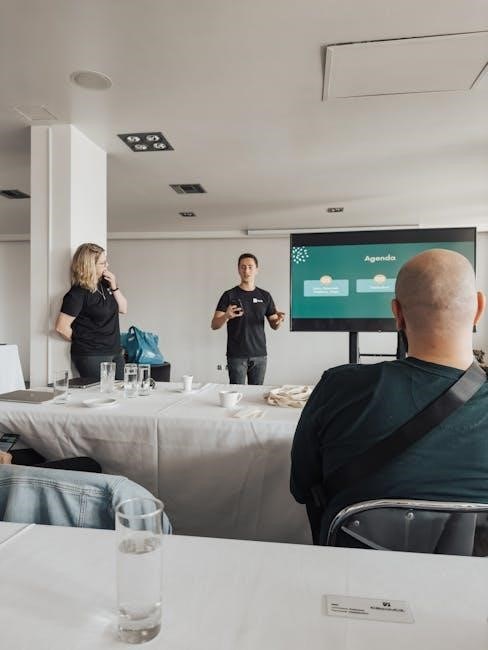
Leadership Workshop Activities
Leadership workshops offer diverse activities, including individual reflections, group exercises, and experiential learning, designed to enhance skills like communication, decision-making, and emotional intelligence through interactive and engaging methods.
3.1 Individual Activities
Individual activities in leadership workshops are tailored to help participants reflect on their personal strengths, weaknesses, and leadership styles. These exercises often include self-assessment questionnaires, journaling, and goal-setting tasks. For instance, participants might brainstorm stereotypes of leadership traits, as seen in exercises where individuals write down characteristics associated with leaders on sticky notes. Another common activity is the Leadership Activity Workshop, where students explore different leadership approaches and identify their own strengths. Handouts and job aids, such as those available at www.amacombooks.org/leadershipact, provide structured guides for these tasks. These individual exercises are designed to foster self-awareness and introspection, enabling participants to align their personal values with leadership principles. By focusing on personal growth, these activities lay the foundation for effective leadership development and empower individuals to take ownership of their learning journey.
3.2 Group Activities
Group activities in leadership workshops are essential for fostering collaboration, problem-solving, and teamwork. These exercises often involve brainstorming sessions, consensus-building games, and role-playing scenarios. For example, participants might engage in a stereotype brainstorming exercise, where small groups write leadership traits on sticky notes to challenge perceptions. Another popular activity is the triangular chase game, a fun, interactive warm-up that encourages quick thinking and coordination. Group activities also focus on decision-making, such as aligning decisions with shared values and goals. These exercises help participants understand group dynamics and develop conflict resolution skills. Handouts and resources, like those available at www.amacombooks.org/leadershipact, often accompany these tasks to guide the process. By working together, individuals gain insights into effective communication and the importance of collective leadership, preparing them to lead teams in real-world scenarios.
3.3 Experiential Learning
Experiential learning is a cornerstone of effective leadership workshops, offering hands-on experiences that transform theoretical concepts into practical skills. Activities like brainstorming leadership traits and stereotype exercises encourage participants to engage deeply with leadership principles. Simulations, such as the triangular chase game, foster quick decision-making and teamwork. These exercises help individuals internalize leadership concepts, making them more applicable in real-world scenarios. Resources, including downloadable templates from www.amacombooks.org/leadershipact, support these learning experiences. By actively participating, individuals develop empathy, humility, and a commitment to serving others. Experiential learning not only enhances leadership skills but also builds confidence, preparing participants to lead effectively in diverse contexts.
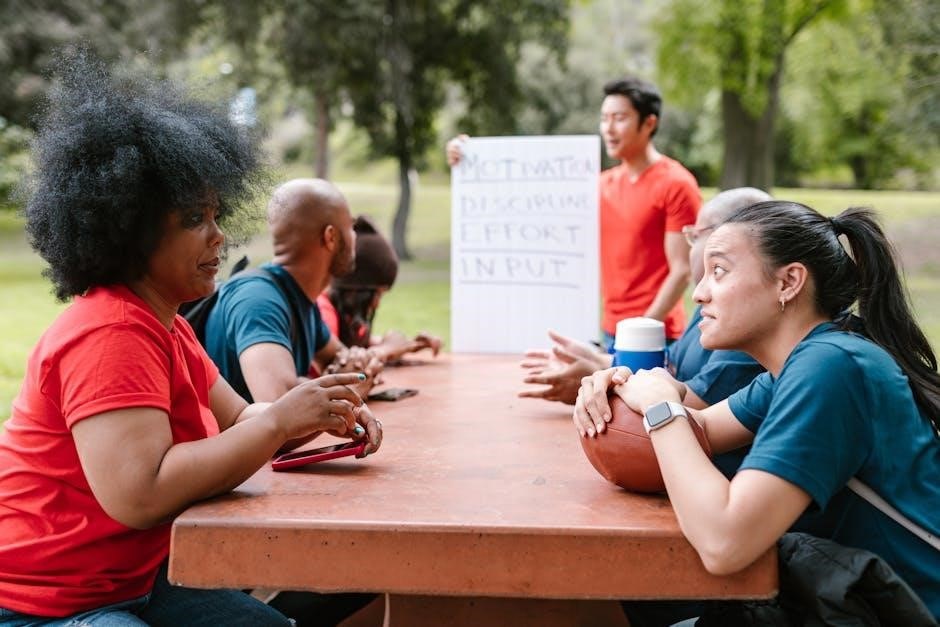
Developing Key Leadership Skills
Workshops focus on enhancing communication, decision-making, and emotional intelligence. Activities like brainstorming and simulations help participants refine these skills, enabling them to lead effectively in diverse professional and personal contexts.
4.1 Communication Skills
Effective communication is a cornerstone of leadership, and workshops often emphasize its development through interactive activities. Participants engage in role-playing exercises, presentations, and group discussions to refine their verbal and non-verbal communication abilities. Activities such as brainstorming sessions and debates encourage leaders to articulate ideas clearly and listen actively. Workshops also incorporate feedback mechanisms, allowing individuals to assess and improve their communication styles. Additionally, tools like communication frameworks and conflict resolution strategies are introduced to enhance interpersonal interactions. These exercises help leaders foster collaboration, build trust, and convey vision effectively. By practicing real-world scenarios, participants gain confidence in navigating complex communication challenges, ensuring alignment and understanding within teams. The focus is on creating a supportive environment where leaders can experiment, learn, and grow in their ability to connect and inspire others. Such skills are essential for driving organizational success and fostering strong relationships.
4.2 Decision-Making
Decision-making is a critical skill for leaders, and workshops often include activities designed to enhance this ability. Participants engage in case studies, group exercises, and problem-solving tasks to practice making informed decisions. These activities simulate real-world scenarios, encouraging leaders to weigh options, consider consequences, and align choices with organizational goals. Workshops also explore decision-making frameworks, such as ethical decision-making models, to help leaders navigate complex situations. Role-playing exercises allow participants to experience different decision-making roles, fostering empathy and collaboration. Additionally, workshops emphasize the importance of data-driven decisions and the role of intuition in leadership. By practicing decision-making in a supportive environment, leaders build confidence and develop the ability to make timely, effective choices. These skills are essential for driving organizational success and addressing challenges with clarity and purpose. The focus is on empowering leaders to make decisions that inspire trust and achieve desired outcomes.
4.3 Emotional Intelligence
Emotional intelligence (EI) is a cornerstone of effective leadership, enabling leaders to understand and manage their emotions and those of others. Leadership workshops often incorporate activities designed to enhance EI, such as self-assessment tools, role-playing exercises, and group discussions. These activities help participants develop self-awareness, empathy, and social skills. For instance, workshops may include exercises where individuals identify and label emotions, practice active listening, or engage in scenarios requiring conflict resolution. Such activities foster a deeper understanding of how emotions influence decision-making and relationships. Additionally, workshops may explore strategies for managing stress and building resilience, which are critical for maintaining emotional balance in challenging situations. By improving emotional intelligence, leaders can create a more supportive and collaborative work environment, driving both personal and organizational success. These skills are essential for inspiring trust, motivating teams, and navigating complex interpersonal dynamics effectively.

Real-World Applications and Case Studies

Leadership workshop activities are often complemented by real-world applications and case studies, providing participants with practical insights into effective leadership. For example, workshops in healthcare settings focus on operational excellence and digitalization, equipping leaders to manage complex systems and ensure patient safety. In educational institutions, leadership programs for students emphasize team building, collaboration, and decision-making aligned with group goals. Corporate workshops often highlight the importance of emotional intelligence and principle-centered leadership, drawing from case studies of successful organizations. These real-world applications demonstrate how leadership skills can be applied to solve problems, improve communication, and drive innovation. Case studies from diverse industries, such as technology and non-profit sectors, further illustrate the universal relevance of leadership development. By connecting theoretical concepts to practical scenarios, workshops empower leaders to address challenges effectively and inspire positive change in their respective fields. Real-world examples also provide a platform for participants to learn from successes and failures, enhancing their readiness to lead in dynamic environments.
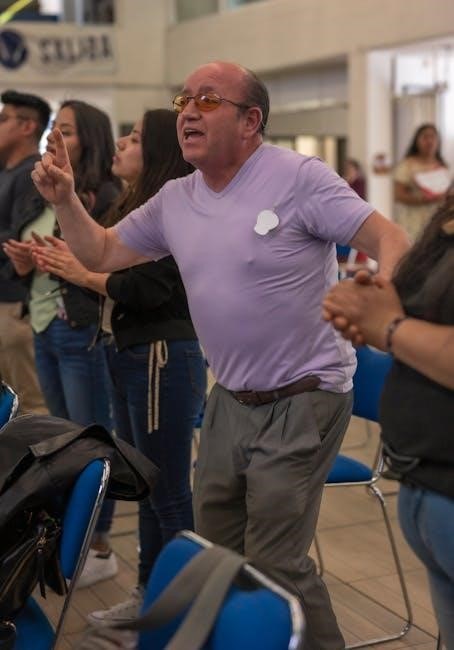
Resources and Materials
Effective leadership workshops rely on a variety of resources and materials to ensure engaging and impactful learning experiences. These resources often include downloadable PDF templates, handouts, and job aids, which participants can use to apply leadership concepts in real-world scenarios. For instance, materials like Handout 3.1 from The Leadership Challenge provide practical tools for understanding leadership traits and decision-making. Additionally, workshops may incorporate audio resources, such as podcasts or audio guides, to explore topics like the evolution of leadership thought and self-leadership. Many organizations offer free or paid access to these materials through their websites, enabling participants to continue their leadership journey beyond the workshop. Community platforms and networking groups also serve as valuable resources, allowing leaders to share ideas, ask questions, and collaborate with peers. These materials and resources are essential for fostering continuous growth and reinforcing the skills developed during the workshop.

Implementing Effective Workshops
Effective workshops require careful planning, including curriculum design and facilitation strategies. Trained facilitators guide participants through activities, ensuring engagement and practical learning. A well-structured curriculum ensures a smooth flow of topics and activities.
7.1 Designing Curriculum
Designing an effective curriculum for leadership workshops involves aligning activities with learning objectives and participant needs. Templates and resources, such as those from www.amacombooks.org/leadershipact, provide structured handouts and job aids. A well-designed curriculum balances individual and group exercises, fostering skills like communication, decision-making, and emotional intelligence. Activities should include experiential learning, such as decision-making exercises and emotional intelligence assessments, to ensure practical application. Handouts like “Leadership Activity Workshop” and “Characteristics of Leaders” guide participants through reflective tasks. Small group activities, such as brainstorming leadership stereotypes, encourage collaboration and understanding of diverse perspectives. The curriculum should also incorporate real-world case studies and feedback mechanisms to assess progress. By integrating these elements, the curriculum ensures a comprehensive and engaging learning experience, preparing participants to apply leadership principles in real-life scenarios.
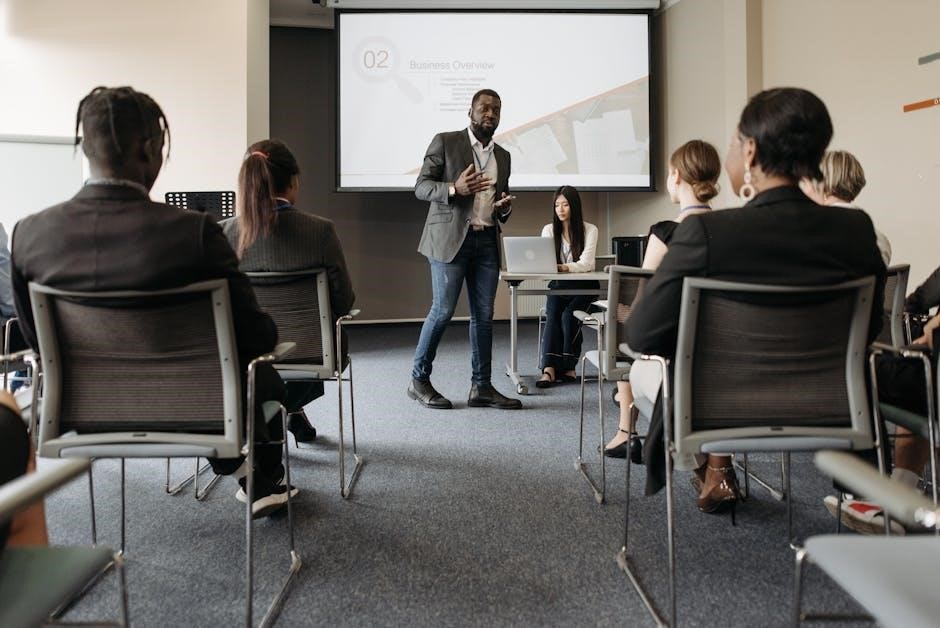
7.2 Facilitating Sessions
Facilitating leadership workshop sessions requires a structured approach to ensure engagement and learning. Effective facilitators create a safe, inclusive environment where participants feel comfortable sharing ideas. Key strategies include active listening, encouraging collaboration, and guiding discussions to align with curriculum goals. Hands-on activities, such as decision-making exercises and emotional intelligence assessments, are essential for experiential learning. Facilitators should provide constructive feedback and encourage participants to reflect on their experiences. Resources like handouts from www.amacombooks.org/leadershipact and interactive tools can enhance session delivery. Small group exercises, such as brainstorming leadership stereotypes, foster teamwork and diverse perspectives. Facilitators must also adapt to participant needs, ensuring activities remain relevant and impactful. By balancing guidance and participation, facilitators empower individuals to develop practical leadership skills, making the workshop a transformative experience.
Leadership workshop activities are a powerful tool for fostering personal and professional growth. By engaging in interactive exercises, group collaborations, and experiential learning, participants develop essential skills like communication, decision-making, and emotional intelligence. These workshops emphasize real-world applications, ensuring that leaders can apply their knowledge effectively in diverse settings. Facilitators play a crucial role in guiding sessions, providing feedback, and creating an inclusive environment for learning. Resources such as handouts from www.amacombooks.org/leadershipact and interactive tools further enhance the experience. Ultimately, leadership workshops empower individuals to lead with empathy, humility, and a commitment to serving others. By focusing on practical skills and transformative experiences, these workshops help participants become confident, principle-centered leaders ready to make a positive impact in their communities and organizations.

